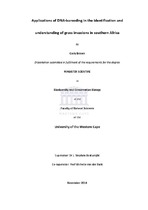Applications of DNA-barcoding in the identification and understanding of grass invasions in Southern Africa
Abstract
The spread of invasive species is one of the greatest threats to global biodiversity. Alien plant invasions also have serious economic impact in terms of the delivery of ecosystem goods and services. Studies of biological invasions in southern Africa have tended to overlook grasses (family Poaceae), although there are many naturalised species in the region. Only a few of these, all perennials, have been officially categorised as invasive in South Africa, but in the winter rainfall region of the Western Cape, grass invasion especially by Mediterranean European annuals have also been noted. These grasses can be difficult to identify. DNA barcoding has been suggested as an alternative method of identifying grasses in the hope of facilitating identification of existing invaders and preventing future invasions. In this study a list of all known naturalised grasses in South Africa was compiled, and a DNA barcoding reference database was assembled for these naturalised grass species as well as for native southern African grass species. The two official markers for plant DNA barcoding (rbcLa + matK) were used in barcoding and phylogenetic analyses, both individually and in combination. The barcoding data was assessed for identification efficacy using three distance-based metrics and one tree-based metric in the R package SPIDER, both including and excluding singleton data. This study lists 128 naturalised grass species and subspecies found in South Africa. In the DNA barcoding analyses, matK was found to perform better as a single barcode than rbcLa, with identification success rates of up to 84% for matK and 76% for rbcLa, using the most successful metric which was the Nearest Neighbour criterion for both of these markers in the data sets without singletons. The combined rbcLa + matK data set performed better than either of the two individual markers, with identification success rates of up to 91% in the data without singletons, with the most successful metric again being the Nearest Neighbour criterion. The combined rbcLa + matK data would therefore be the recommended DNA barcode for southern African grasses of the three data sets tested, based on the results of this study. Phylogenetic trees were constructed with the DNA barcoding data using Bayesian Inference (BI) and Maximum Parsimony (MP) to assess the usefulness of the data in phylogenetic studies and to confirm the efficacy of this grass DNA barcoding data when using tree-based methods of identification. Both the matK and combined datasets resolved all of the grass tribes represented in this study as monophyletic, but the rbcLa data did not.

